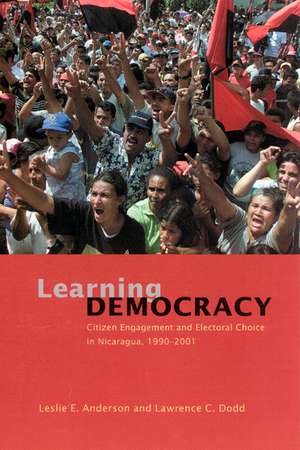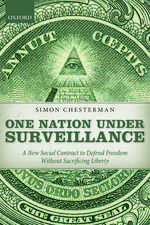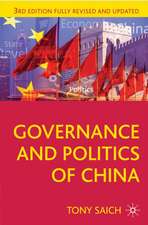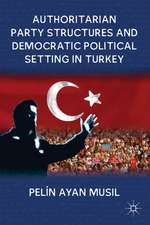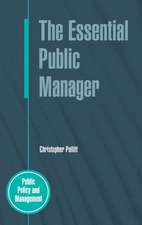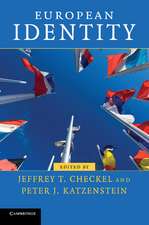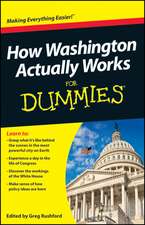Learning Democracy: Citizen Engagement and Electoral Choice in Nicaragua, 1990-2001
Autor Leslie E. Anderson, Lawrence C. Dodden Limba Engleză Paperback – 9 mai 2005
Historically, Nicaragua has been mired in poverty and political conflict, yet the country has become a model for the successful emergence of democracy in a developing nation. Learning Democracy tells the story of how Nicaragua overcame an authoritarian government and American interventionism by engaging in an electoral revolution that solidified its democratic self-governance.
By analyzing nationwide surveys conducted during the 1990, 1996, and 2001 Nicaraguan presidential elections, Leslie E. Anderson and Lawrence C. Dodd provide insight into one of the most unexpected and intriguing recent advancements in third world politics. They offer a balanced account of the voting patterns and forward-thinking decisions that led Nicaraguans to first support the reformist Sandinista revolutionaries only to replace them with a conservative democratic regime a few years later. Addressing issues largely unexamined in Latin American studies, Learning Democracy is a unique and probing look at how the country's mass electorate moved beyond revolutionary struggle to establish a more stable democratic government by realizing the vital role of citizens in democratization processes.
By analyzing nationwide surveys conducted during the 1990, 1996, and 2001 Nicaraguan presidential elections, Leslie E. Anderson and Lawrence C. Dodd provide insight into one of the most unexpected and intriguing recent advancements in third world politics. They offer a balanced account of the voting patterns and forward-thinking decisions that led Nicaraguans to first support the reformist Sandinista revolutionaries only to replace them with a conservative democratic regime a few years later. Addressing issues largely unexamined in Latin American studies, Learning Democracy is a unique and probing look at how the country's mass electorate moved beyond revolutionary struggle to establish a more stable democratic government by realizing the vital role of citizens in democratization processes.
Preț: 289.80 lei
Nou
Puncte Express: 435
Preț estimativ în valută:
55.48€ • 57.06$ • 46.03£
55.48€ • 57.06$ • 46.03£
Carte tipărită la comandă
Livrare economică 19 februarie-05 martie
Preluare comenzi: 021 569.72.76
Specificații
ISBN-13: 9780226019727
ISBN-10: 0226019721
Pagini: 336
Ilustrații: 17 line drawings, 20 tables
Dimensiuni: 152 x 229 x 28 mm
Greutate: 0.51 kg
Ediția:1
Editura: University of Chicago Press
Colecția University of Chicago Press
ISBN-10: 0226019721
Pagini: 336
Ilustrații: 17 line drawings, 20 tables
Dimensiuni: 152 x 229 x 28 mm
Greutate: 0.51 kg
Ediția:1
Editura: University of Chicago Press
Colecția University of Chicago Press
Notă biografică
Leslie E. Anderson is associate professor of political science at the University of Florida. She is the author of The Political Economy of the Modern Peasant. Lawrence C. Dodd is the Manning J. Dauer Eminent Scholar Chair in Political Science at the University of Florida. He is the author of Coalitions in Parliamentary Government and coeditor of seven editions of Congress Reconsidered.
Cuprins
Preface
1. The Democratic Experiment in Nicaragua: An Introduction
1. The Democratic Experiment in Nicaragua: An Introduction
Part I. Pathways toward Democracy: The Case of Nicaragua
Chapter 2. Foundations of Nicaraguan Democracy: Space, Class, and Party
Chapter 3. Embracing Electoral Choice: Political Discourse and the 1990 Campaign
Chapter 2. Foundations of Nicaraguan Democracy: Space, Class, and Party
Chapter 3. Embracing Electoral Choice: Political Discourse and the 1990 Campaign
Part II. Choice amidst Crisis: Public Opinion in 1990
Chapter 4. An Empirical Theory of Electoral Choice
Chapter 5. Citizen Attitudes in 1990: Candidates, the Economy, and the Regime
Chapter 6. The Voters Are Not Fools: Modeling the 1990 Presidential Election
Chapter 4. An Empirical Theory of Electoral Choice
Chapter 5. Citizen Attitudes in 1990: Candidates, the Economy, and the Regime
Chapter 6. The Voters Are Not Fools: Modeling the 1990 Presidential Election
Part III. Affirming the 1990 Choice: The 1996 and 2001 Elections in Context
Chapter 7. The Post-1990 Context: Democratic Foundations and Public Choice
Chapter 8. Reaffirming Citizen Choice: The 1996 and 2001 Elections
Chapter 9. Learning Democracy In and From Nicaragua: Concluding Perspectives
Appendix
Bibliography
Chapter 7. The Post-1990 Context: Democratic Foundations and Public Choice
Chapter 8. Reaffirming Citizen Choice: The 1996 and 2001 Elections
Chapter 9. Learning Democracy In and From Nicaragua: Concluding Perspectives
Appendix
Bibliography
Recenzii
"I can hardly exaggerate my sense of the importance of this book's conclusions, not only for political scientists and others concerned with understanding transitions to democracy, but for policy makers as well. Learning Democracy is strikingly original and more hopeful than most interpretations and forecasts."
"This path-breaking book reveals the enormous political capacity of common citizens to exercise informed democratic choices, even, or perhaps especially, in the most demanding of circumstances. The book's findings resonate with democratic experiences not only in Latin America, but also across much of Africa."
"Learning Democracy makes a powerful and convincing argument that the electorate in Nicaragua over the 1990-2001 period made a deliberate, reasoned choice as it confronted three different presidential elections. This is a landmark work in the area of analyzing vote choice in a Latin American democratizing context on the basis of extensive survey data."
"This is a work that makes the reader a better political scientist, telling a fine story in the process. Steeped in the voting behavior literature as it has developed during the last half-century in the U.S., Learning Democracy also offers broader lessons having to do with how individuals struggle to make decisions when institutions are developing. A classic of how to do electoral analysis through time and polls, this book's audience is likely to include people interested in voting behavior, democratic development, Latin American politics, and decision-making. It will serve as a model of how to do comparative research."
"An insightful analysis which makes a significant contribution to the study of democratisation in developing countries."
"A noble attempt to apply democratic voting theories honed by political scientists who studied U.S. voting behavior to a very different reality in Nicaragua."
